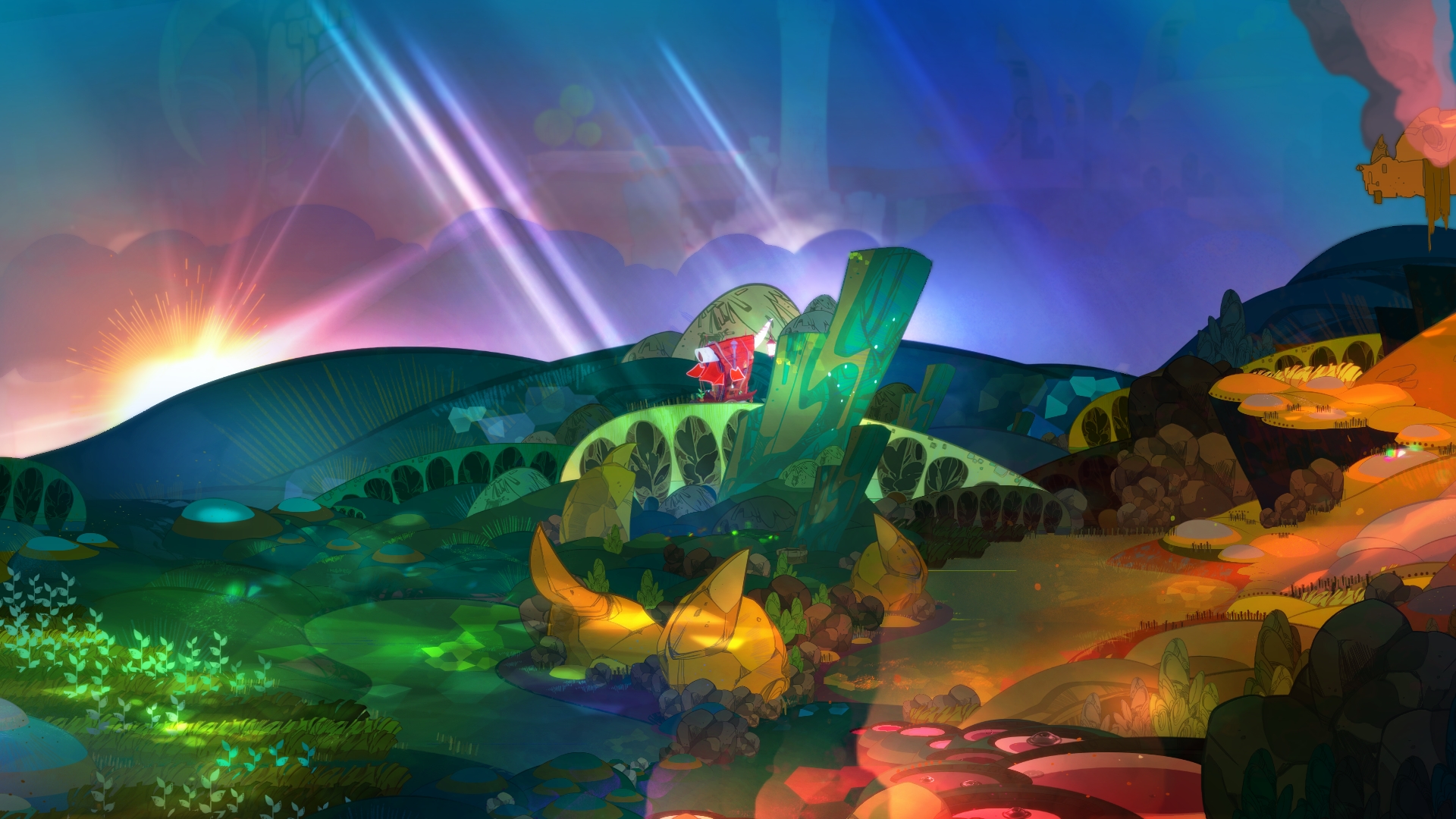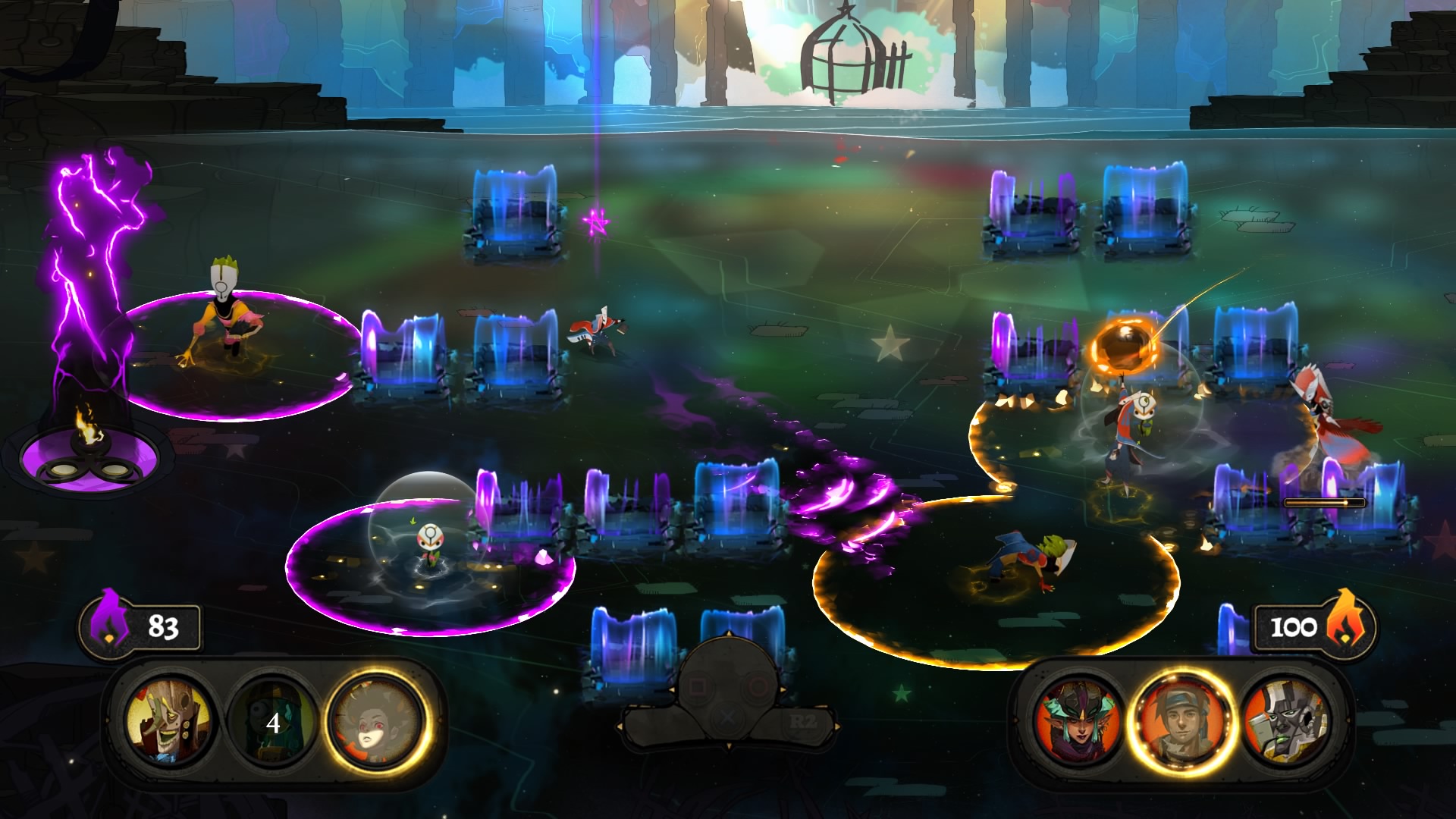Search
[{{{type}}}] {{{reason}}}
{{/data.error.root_cause}}{{{_source.title}}} {{#_source.showPrice}} {{{_source.displayPrice}}} {{/_source.showPrice}}
{{#_source.showLink}} {{/_source.showLink}} {{#_source.showDate}}{{{_source.displayDate}}}
{{/_source.showDate}}{{{_source.description}}}
{{#_source.additionalInfo}}{{#_source.additionalFields}} {{#title}} {{{label}}}: {{{title}}} {{/title}} {{/_source.additionalFields}}
{{/_source.additionalInfo}}Pyre (PC)

Pyre
Developed By: Supergiant Games
Published By: Supergiant Games
Released: July 25, 2017
Available On: PS4, Linux, macOS and Windows
Genre: RPG
ESRB Rating: E10+ for Everyone 10 and older, for Fantasy Violence, Tobacco Reference, Mild Language, and Use of Alcohol
Number of Players: 1-2 offline
Price: $19.99
Supergiant Games, the famous indie developers behind cult hits Bastion and Transistor, hardly require introduction. Their knack for creating new, artful, wonky aesthetics in settings a player could hardly dream up continues with their third stand-alone title: Pyre.
Pyre starts off by dropping you, quite literally, face-down in the sand. A roving band stops to examine your body, decides to pick you up, and introduces you to their squad. You are the Reader, a being with the rare gift to translate written text. Your ability to read proves very useful, as it allows you to guide your squad in 3v3 psychic basketball called the Rites.
At select times throughout your journey, you will compete with other teams in the Rites. As it turns out, everyone in your group – including yourself – has been banished to this very colorful, aesthetically-pleasing purgatory. Emerging victorious from the Rites will let you earn a character’s freedom back to the world that banished them.
Now that I think about it, Pyre’s premise sounds uncannily similar to a unique, much friendlier version of the Hunger Games. Many of the compatriots you recruit are good individuals who’ve either netted a little too much bad and got caught, or disobeyed bad laws because they felt compelled to do the right thing. While most of your opponents hold clearly unsavory intentions, some express good or neutral qualities about them, and one team is always honorable to you: I felt bad winning against them, and good for having competed against respectable enemies.

Strong Points: Unique art and setting, beautiful music, original style of gameplay.
Weak Points: Hit-or-miss aesthetic, inconsistent difficulty.
Moral Warnings: Strong occult and magical themes, swearing (da**, sh**).
Pyre’s gameplay splits twofold. Most of the game, you will scroll through dialogue, select responses (fewer than three vastly different replies is rare for this game), scroll through more dialogue, click on oddities, and scroll through yet more dialogue. Right when you get tired of said dialogue, it’s time to face a team in a Rite. As mentioned before, this style of gameplay is best described as a magical 3-vs.-3 with a special, psionic basketball. Players rotate between three different characters, each with pros and cons: high speed, low presence; very high presence, low stamina; low presence, very wide attack. Presence refers to the area around a character when performing in a Rite; if an enemy comes into contact within the range of this presence, they are momentarily banished and out of play for a few seconds. In that regard, the Rite resembles a hockey game, with more frequent power plays (one team being down in manpower).
Grabbing the mystical orb in the center at the start of a round, the player must coordinate all performing team members, passing it, moving forward, keeping it away from the enemy, and either dashing into the opposition’s flame, or tossing it from afar. Diving into the flame guarantees a lot of “dousing” to the enemy’s flame, their “Pyre,” but prevents that character from participating in the next round. Throwing the orb, on the other hand, doesn’t penalize like that, but leaves the player open to enemy attacks, and the orb can be intercepted mid-trajectory.
Characters gain experience after Rites and, upon leveling up, unlock powerful abilities to aid them in future Rites. I found Normal difficulty just fine and dandy till about my fifth Rite, where the difficulty suddenly spiked. The final Rites will require your accumulated knowledge and skills if you want to succeed.
A couple things Supergiant Games has always done well are its visuals and music. All three of their titles define the indie genre for their artistic originality and genuine uniqueness. Darren Korb’s soundtracks are always must-buys, period. For Pyre, he composed an eclectic mix of medieval instruments and low-fi hip hop. I honestly can’t put my finger on it, but it’s different, and it’s good! Pyre’s visuals, likewise, evoke a combination of styles you wouldn’t expect. Personally, Pyre’s visual aesthetic was more miss than hit, though I do not hold that against the art directors. That’s my preferential bias at play; I don’t question their ability, nor do I discourage players from trying Pyre on that point. Pyre looks fantastic, in all senses of the word.

Higher is better
(10/10 is perfect)
Game Score - 92%
Gameplay - 17/20
Graphics - 9/10
Sound - 10/10
Stability - 5/5
Controls - 5/5
Morality Score - 66%
Violence - 6/10
Language - 7/10
Sexual Content - 10/10
Occult/Supernatural - 2/10
Cultural/Moral/Ethical - 8/10
Spiritually, Pyre has some obvious problems. While I couldn’t find any sexual references, the occult nature of Pyre’s world presents itself everywhere. Magic powers the Rites. Ancient gods, tied to the stars, silently interact from time to time with the mortals in their purgatory. Fantastical beasts, partially based on our myths, roam both sides of Pyre’s world. You can purchase potions, elixirs, and “star power” at the traveling shop. Goodness, even the kindly, mother-like Jodariel is called a “demon!”
Language is more read than heard. The characters speak enthusiastic gibberish that sounds like a convincing combination of Portuguese and Italian. I remember reading the occasional curse word - "da** for sure, and possibly "sh**."
To call Pyre “violent” is a bit of a stretch. As noted in the occult portion, nearly all of the obviously questionable material is magical in nature. Rarely do characters die; banishment during Rites is temporary, more like a body check will knock you off your feet, not like a fatal shotgun blast to the face.
Overall, Pyre represents Supergiant Games’ successful attempt at a long, player-choice game. I clocked in six hours for Bastion and Transistor, yet sixteen hours for Pyre. Bastion offered a very compact story with two game-altering decisions at its conclusion; Transistor supplied the player with more choice, though still contained in the size of Bastion. Pyre, rather, plays akin to classic Chrono Trigger, where right from the get-go, you alter the course of the rest of the game through your decisions. Your choices to fulfill certain story elements will in turn increase the game's difficulty in a way you don't expect. Some of your friends may not make it out of banishment. Some of your enemies might earn their freedom instead! Before the end credits, every character you encountered receives a summary of their life after the climax, including yourself (you are the Reader, after all); how great or how lamentable they end up, is up to you.
- Anax






